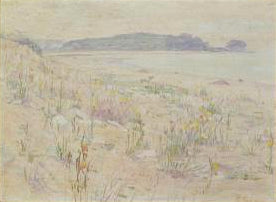Beskrivelse
Fujishima Takeji's painting "Morning on the Beach" (1898) is a work that encapsulates the essence of the style and artistic sensibility of the Meiji period in Japan. This period, characterized by a considerable openness to Western artistic influences and a desire to modernize Japanese culture, is perfectly reflected in the work of Fujishima, who was a prominent painter of the yōga school, which fuses Western techniques and themes with Japanese aesthetics.
In this work, the viewer is greeted by a composition that exudes tranquillity and harmony. The structure of the painting is dominated by a coastal setting, where the beach stretches out inviting contemplation. The use of natural light, which plays on the surface of the water and reflects on the sand, suggests the freshness of a clear morning. The colour palette used by Fujishima is subtle and sophisticated, with a predominance of soft tones ranging from sky blue to white and beige, evoking the serene atmosphere of the coast and the calm of dawn.
The presence of human figures feels ethereal and delicate, like a whisper within the landscape. At the center of the composition are a woman and a child, who seem to be collecting shells or seafood, engaging the viewer with their simplicity and subtle movement. These figures offer a contrast to the vast expanse of the ocean, establishing a connection between humans and nature. The woman’s traditional clothing, decorated with patterns reminiscent of classic Japanese clothing, adds a significant cultural component, showing the fusion of modernity with tradition.
A remarkable aspect of this painting is the representation of light. Fujishima uses a masterful technique to capture atmospheric effects, in which natural light becomes another character within the work. This can be seen not only in the treatment of water, where the waves seem to come to life, but also in how the light caresses the faces of the characters, giving them a softness and an almost idealized beauty.
The work can be seen as a reflection of Fujishima's desire to capture the essence of everyday Japanese life at a time of cultural transition. The contemplation of time and nature, far from being merely decorative, invites reflection on the relationship between humans and their environment. This approach would resonate with the public of his time, who found themselves caught between modernity and traditionality, making this work an object of study and interest.
The significance of “Morning at the Beach” lies not only in its aesthetic beauty, but also in its ability to capture a moment in the history of modern Japanese art. Fujishima Takeji, like other contemporary artists, sought a visual language that could speak to both tradition and modernity, creating a bridge between eras and styles. Ultimately, this work is not only a visual delight, but an invitation to reflect on cultural identity in a context of change.
KUADROS ©, a famous painting on your wall.
Hand-made oil painting reproductions, with the quality of professional artists and the distinctive seal of KUADROS ©.
Painting reproduction service with satisfaction guarantee. If you are not completely satisfied with the replica of your painting, we will refund 100% of your money.

